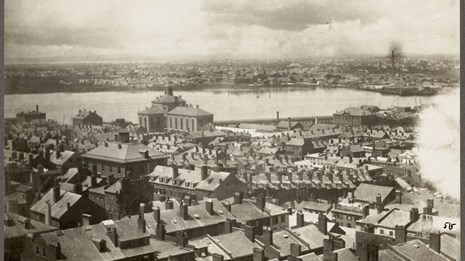Last updated: May 3, 2023
Person
Alvah A. Burrage

State Library of Massachusetts "Legislator's Photographs" collection
Boston businessman and later political leader Alvah Burrage joined the abolition movement at an early age and served on the 1850 Boston Vigilance Committee.
Born in 1823, Alvah A. Burrage grew up on his family’s farm in Leominster. He worked here during his youth, while also attending public school. At sixteen years old, he moved to Boston to “learn the business of selling woollen goods.” At first, Burrage worked for the firm of Richardson & Burrage until Wilkinson, Stetson, & Co. took over and kept him on because of his expertise and customer contacts. He later left them and formed a new business with his brother.1
While a merchant in the city, Burrage became involved in the abolitionist movement. According to Reverend E.A. Horton, a eulogist at Burrage’s funeral:
...when but twenty years of age, [Burrage] became a devoted follower of Theodore Parker, and soon after espoused the anti-slavery cause. It was in the anti-slavery work that he found a field for his grand career.2
Newspapers listed his donations to abolitionist organizations such as the Massachusetts Anti-Slavery Society, the American Anti-Slavery Society, and other groups.3
In 1850, Burrage participated in the anti-fugitive slave law meeting held at Faneuil Hall and became a member of the third and final iteration of the Boston Vigilance Committee. This organization assisted freedom seekers arriving in Boston on the Underground Railroad. Francis Jackson’s account book of the Boston Vigilance Committee showed several financial contributions from Burrage throughout the 1850s.4
Considered a “staunch Republican,” Burrage also involved himself in local and state politics.5 He served two years in the state legislature in the 1860s. He later became a member of the Board of Aldermen for the City of Boston for several years in the 1870s. Burrage also worked in an appointed role on the Commission on the Treatment of the Poor in the city.6
Burrage died suddenly at age 70 in 1893.7 In his eulogy of Burrage, Reverend E.A. Horton said:
Whether you agreed with him in all he said and did, you yet respected and admired the earnestness and fidelity with which he devoted himself to everything he undertook.8
His remains are buried at Mount Auburn Cemetery.
Footnotes
- In 1850, Burrage worked at 53 Milk Street (Wilkinson, Stetson & Co.) and lived at 24 Oak Street, Boston City Directory, 1850-1851, 105, 359, 1850-1851, The Directory of the city of Boston. - Boston Directory, 1789 to 1901 - (bostonathenaeum.org), "Members of the Committee of Vigilance," broadside printed by John Wilson, 1850, Massachusetts Historical Society; Alvah A. Burrage, The Burrage Memorial: A Genealogical History of the Descendants of John Burrage, Who Settled in Charlestown, Mass., in 1637, (Boston: Alfred Medge and Son, 1877), 129-133, https://archive.org/details/burragememorialg00burr_1/mode/2up?q=alvah.
- “Two Clergymen Officiated,” Boston Evening Transcript, November 8, 1893.
- Liberator, June 21, 1850, 3; Liberator, July 31, 1857, 3; Liberator, Feb 14, 1862.
- Francis Jackson, Account Book of Francis Jackson, Treasurer The Vigilance Committee of Boston, Dr. Irving H. Bartlett collection, 1830-1880, W. B. Nickerson Cape Cod History Archives, 31, 59, https://archive.org/details/drirvinghbartlet19bart/page/n3/mode/2up.
- “Mortuary Notice,” Boston Daily Journal, November 7, 1893.
- "The Alderman," Boston Globe, May 7, 1878, 2.
- “Funeral of Alvah Burrage,” Boston Globe, November 8, 1893, 3.






